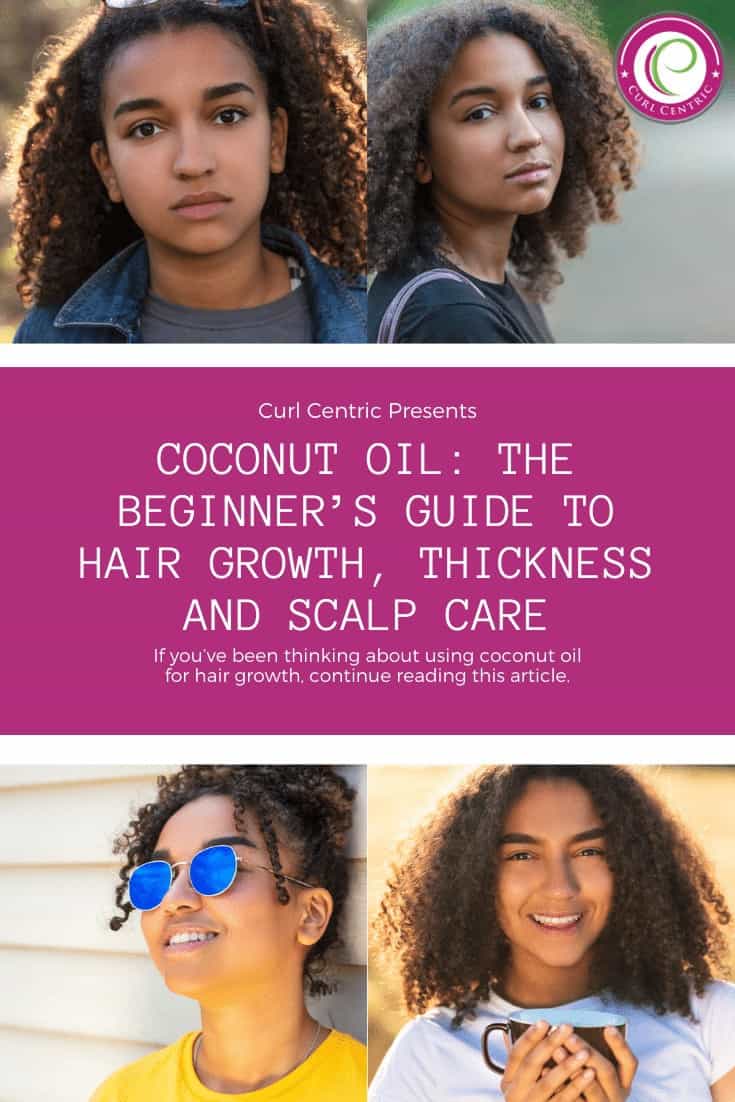
Coconut oil is a natural product that can be used for hair growth and thickness. In this blog post, we will discuss coconut oil's benefits as well as the best coconut oils on the market to use!
Did you know that coconut oil is a great treatment for hair growth and thickness? It's one of the most talked-about essential oils within the natural hair community.
Table of Contents
- 1 The Benefits of Using Coconut Oil for Hair Growth and Scalp Care
- 1.1 1. Using Coconut Oil to Boost Hair Growth
- 1.2 2. Use Coconut Oil as a Pre-Treatment Before You Shampoo
- 1.3 3. Natural Properties in Coconut Oil Help Dyeing Hair
- 1.4 4. Help with Frizzy Hair and Split Ends
- 1.5 5. Spruce up for Summer
- 1.6 6. An All-Natural Remedy for Lice and Scalp Health
- 1.7 7. Combating Dandruff and Keep Your Scalp Healthy
- 1.8 8. Detangle Your Hair with Coconut Oil
- 1.9 9. Boost Shine
- 1.10 10. Antifungal Properties
- 2 How to Use Coconut Oil in Your Hair Regimen
- 3 Travel-sized Coconut Shampoo for Curly Hair
- 4 Creamy DIY Coconut Milk Shampoo for Dry Hair
- 5 Coconut and Jojoba Hair Shampoo
The Benefits of Using Coconut Oil for Hair Growth and Scalp Care
This article will at the benefits of using coconut oil for healthy hair growth and scalp care. We'll also provide homemade DIY coconut oil hair growth recipes to use within your hair care routine.
1. Using Coconut Oil to Boost Hair Growth

Of all the claims that various hair products make, nothing tops the elusive holy grail of hair growth. Of course, in the Arthurian Lore, the promises of the grail get bigger with time.
In its earliest appearance in Chretien de Troyes, it’s a simple chalice, by the time of Sir Thomas Mallory, it has miraculous powers, and by the time of Indiana Jones and the Quest for the Holy Grail – well, you get the point.
Hair growth promises for essential oils often work much the same way, especially with coconut oil.
Today, there’s somewhat of a misconception of coconut oil as, like the grail, having “miraculous powers,” when in fact, the truth of its efficacy is a lot more grounded in reality.
The “root” of essential oils’ hair restoration abilities lie in their ability to soothe scalp dryness, irritation, and inflammation. When your scalp is dried out, irritated, or inflamed, hair follicles are vulnerable.
This can lead to everything from dandruff to hair loss to both at once.
So while coconut oil (or extra virgin coconut oil) may not be a magical elixir that will regrow hair itself, it will create the necessary conditions for growth to resume.
If your scalp has been ravaged by dryness, coconut oil can be a great choice for soothing and moisturizing your scalp.
Of course, some take things further. Cynthia Alvarez, a hairstylist for several Hollywood stars, swears by coconut oil, claiming in a Marie Claire article that its nutrients can indeed help spur hair growth, and she isn’t the only one.
Stephanie Brown, a fellow hairstylist, and colorist is quoted in that same article. It echoes her stylist compatriot's praise for coconut oil’s potential, mentioning that a 5 to 10-minute coconut oil treatment mask every one or two weeks can help support hair growth.
However, compelling as those comments may be, they are still “just” anecdotes (albeit from legitimate hairstylists and hair care specialists), and science doesn’t abide by the anecdotal.
Dr. Shari Marchbein, a New York board-certified dermatologist and assistant professor of dermatology at NYU School of Medicine, denies there are any “credible studies…linking the use of coconut oil to faster hair growth."
However, she is in line with Alvarez and Brown in claiming that coconut oil can “strengthen hair and nourish the scalp” and notes that while this does not directly make your hair grow longer, it can, over time, indirectly create favorable conditions for hair growth.
2. Use Coconut Oil as a Pre-Treatment Before You Shampoo

It's commonly thought that coconut oil, which includes lauric acid and several other fatty acids, can revitalize hair that might otherwise be damaged by shampoo.
It is true that some shampoos can strip away natural oils from your scalp, which can leave them dried out and thus cause some of the hair care problems you’re trying to avoid.
This is where the real moisturizing power of coconut oil comes into play. While it may not be able to regrow hair like magic, treating your hair with coconut oil before shampooing can help moisturize it and protect your natural oils against the shampoo.
The result can give you the best of both worlds – freshly shampooed hair and a scalp that retains some of the natural oils necessary for maintaining softer, more lively hair.
Learn More: How to Make the Best of Your Pre-pooing Routine
3. Natural Properties in Coconut Oil Help Dyeing Hair

If you have ever tried dyeing your hair before, you know there’s a fine line between leaving it looking colorized and ragged.
Hair can be sensitive, especially to the chemicals involved in different kinds of hair dye, which is why adding a protective agent before you start the dyeing process isn’t a bad idea.
As with the thought that coconut oil can generate hair growth, the idea that coconut oil can help with dyeing your hair is a complex one.
On the one hand, as long as you allow the coconut oil plenty of time to seep into your hair before you use the dye, it should be completely safe to use.
Doing so can definitely help nourish your hair and guard against some of the risks of the dyeing process.
However, if you try to dye your hair too quickly after applying the coconut oil, you may find that the dye doesn’t stay on your hair, or the color won't apply correctly.
To be clear, you don’t need to rinse the coconut oil out of your hair before you start the dyeing process, and there can be benefits to using it as part of your pre-dye prep.
That said, you need to proceed with care and give your hair plenty of time to absorb it properly before moving ahead with the hair dye.
4. Help with Frizzy Hair and Split Ends
On the one hand, this is by no means a permanent solution to the neverending battle of frustrating frizzes and nagging split ends.
On the other hand, coconut oil can be a short-term solution, penetrating the hair shafts and smoothing them out, potentially repairing damaged hair temporarily.
5. Spruce up for Summer

You may love fun in the sun, but that doesn’t mean your hair does.
Prolonged exposure to UV rays can damage your hair cuticles, leading to everything from discoloration and dryness to brittleness and those very split ends and hair frizzes we just talked about.
Coconut oil can block those harmful UV rays. Once again, however, there’s a risk of overstating things.
Just because coconut oil can block UV rays doesn’t mean it can create as effective of a barrier between the sun and your scalp as sunscreen or a hat.
If you’re anxious about extreme heat damaging your hair come summertime, coconut oil should be just the start and not the end of any hair-saving solution you attempt.
Coconut oil products can help hair against extreme heat. However, we always recommend adjusting depending on how your hair responds.
If you plan to use heat styling tools, heat protectants are designed to protect hair against high temperatures that often cause heat damage. We don't recommend using coconut oil as a replacement for a proper heat protectant.
6. An All-Natural Remedy for Lice and Scalp Health

Few thoughts are more unsettling than the thought of something creepy-crawly crawling away through the strands of your hair, or laying eggs to hatch on your scalp.
Such is the case with head lice, one of the most well-known and much-dreaded hair pests.
Here again, many people sing the praises of coconut oil, this time as the haircare equivalent of an insecticide.
People will often try using coconut oil paired with a subsequent apple cider vinegar mix to fight head lice. This is to ensure that you’ve gotten all of the lice and any eggs they may have left behind.
However, it's unlikely that coconut will successfully eliminate lice on its own, and consequently, many people advocate for using tea tree oil as another oil to keep lice in check.
It’s also worth noting that cedarwood has also been demonstrated to have natural insect-repelling properties.
That said, no natural remedy on its own should be taken as a replacement for a proper visit to the doctor. Don’t wait around thinking that an all-natural solution is going to solve your lice problem.
The last thing you want to do is give lice time to get out of control, so if you find out that you have a lice issue, get yourself to a board-certified dermatologist as quickly as possible for proper treatment.
Use can always apply one or more of these remedies in the meantime to hopefully at least keep things from getting worse.
7. Combating Dandruff and Keep Your Scalp Healthy

No one likes having to deal with a flutter of flakes falling onto their shoulders every time their hair gets a bit rumpled.
This is another case where coconut oil can come to the rescue. A 2016 study examined coconut oil’s role as a means of managing dandruff and reinforced the idea that it is effective in this regard.
You can rub a bit of coconut oil onto your scalp for around five minutes and then shampoo it out to help mitigate dandruff.
8. Detangle Your Hair with Coconut Oil
This benefit is a bit less medicinal and more in the beautifying realm of hair care. That said, there’s nothing healthy about having your hair tangled up in knots.
If you have one or more hair knots that are especially stubborn, coconut oil with its natural moisturizing powers can add a bit of lubrication to help you detangle your hair strands.
9. Boost Shine
For as necessary as it is to keep your hair in good condition, health without beauty lacks vivacity. Thankfully, coconut oil can contribute to your hair and scalp in both ways.
Not only is it an effective moisturizer, but it can also give your hair some extra shine to your lustrously luscious locks.
However, since the oil does penetrate the hair strands, it does not provide long-lasting shine to your hair.
Coconut oil also needs time to work since it has to penetrate between the tiny spaces of the cuticle, so the initial shine provided will fade as the oil penetrates the hair follicles.
10. Antifungal Properties

No matter how much softness or shine you give your hair, it won’t matter much if your hair is crawling with fungal or bacterial infections.
If you let those infections take root, they can cause damage to your hair and even potential hair loss.
The scientific standing for claims of coconut oil’s efficacy in helping with fungal and bacterial infections is far more well-substantiated than those of hair growth.
For example, a 2019 study found that several all-natural oils often used for hair care purposes, including coconut oil, “can be used to develop antifungals drugs.”
In addition, its status as an anti-dandruff supplement can also trace its value back to its antifungal and antibacterial properties, since preventing bacterial or fungal infections can help prevent dandruff to an extent.
That case is strengthened all the more by studies showing that coconut oil is not just an antifungal and antibacterial agent.
Still, it is effective at killing yeast infections, which can also pose serious scalp trouble. Separate studies in 2007 and 2014 backed this point up.
How to Use Coconut Oil in Your Hair Regimen

If you plan to use coconut oil to treat a yeast infection, rub it on the affected area. If you plan to apply it as a hair mask or hair oil, you’ll want to use it in different ways.
For a hair mask, you’ll first want to warm (rub it between your palms should be enough) the coconut oil. We don't recommend heating it in the microwave, as shown in the tutorial video below.
Since it is harder than other oils, it tends to need a bit of softening up first. You’ll also want to make sure that you start small – a teaspoon should do.
Apply coconut oil to your hair. Use a wide-tooth comb or something similar to distribute the oil through your hair.
Start near your ears and work your way around. Leave the mixture in for 30 minutes.
That said, if you are doing this before you go to bed, you can also leave it in overnight.
You can also try experimenting with mixing it with lemon juice and other substances. After 30 minutes, rinse it out.
If you are applying it directly to your hair as hair oil instead, you’ll again want to warm up and prep the coconut oil before applying it to those same areas around your ears and working your way around.
Travel-sized Coconut Shampoo for Curly Hair
For this recipe, you’ll need the following products:
- 1 cup of aloe vera gel
- ½ of water
- 2 tbsp. of glycerin
- 1 tsp. of castor oil
- Primrose capsule
- Rosemary essential oil
- Lavender essential oil
- Peppermint essential oil
- 1 cup of coconut liquid soap as your base.
You’ll also need the following supplies:
- 2 bowls
- A measuring cup
- Shampoo bottle (either a spouted bottle or blank press bottle)
- Travel shampoo
- Mixing spoon
- (Optional) Hand mixer
Instructions:
Step 1: Grab your bowl and spoon. Place ½ cup of water, 2 tablespoons of glycerin, 1 cup of aloe vera gel, and 1 teaspoon of castor oil into one bowl.
Step 2: Mix until smooth.
Step 3: Next, grab your shampoo bottle and put in 1 cup of coconut oil liquid soap that you’re using for your base in your second bowl. Using the same bowl, grab a capsule of primrose and break it into the same bowl.
Step 4: Add in 10-20 drops of each essential oil. I encourage you to add in the amounts you feel comfortable with because your hair needs may vary each time you use this recipe. Some smells may overpower others, so use as much as you prefer to have in your shampoo.
Step 5: Once you’ve placed all the ingredients in, mix well.
Step 6: Finally, combine the contents of both bowls, and use your hand mixer to whisk your product for the last time. Once you’re satisfied, combine them into your shampoo dispenser. Now, you’re done! You’ve created your own shampoo to clean your hair and scalp removing product buildup.
Benefits of this recipe:
I loved this recipe because there are so many useful, clean products in it. Aloe vera gel is an excellent cleanser and will be great to use if you typically use several products in your daily haircare routine.
Aloe vera gel is also known to help with dandruff as well. What I especially love is that the aloe and coconut oil base will give your shampoo a satisfying amount of slip.
Another thing that I love about this recipe is the combination of essential oils. Primrose, lavender, peppermint, and rosemary are known for their relaxing, anti-inflammatory benefits.
Peppermint and rosemary are usually the most popular whenever you consider a soothing essential oil, but the lavender and primrose will be excellent boosts for your scalp's health.
If you’re wondering how to travel with coconut oil, the coolest thing of all is that there is just shampoo here to fill one travel-sized bottle of coconut oil.
Often people don’t want to use the shampoo that hotels provide. So why not have your own take on the road? Keep in mind that this recipe can be kept in your pantry and won’t expire for 2-3 months.
Creamy DIY Coconut Milk Shampoo for Dry Hair
For this recipe, you’ll need the following products:
- 1 cup of olive oil liquid soap
- ½ cup distilled water
- ½ cup unsweetened, canned coconut milk
- 10-20 lemongrass essential oil
You’ll also need the following supplies:
- 2 bowls
- A measuring cup
- Shampoo bottle (either a spouted bottle or blank dispenser bottle)
- Mixing spoon
- (Optional) Hand mixer
Instructions:
Step 1: In a bowl, place your olive oil liquid soap, water, and coconut oil into one container and mix thoroughly.
Step 2: Add a few drops of your essential oil.
Step 3: Place your products into one bottle and voila!
Benefits of this recipe:
I loved that this recipe was significantly simpler than the first recipe. If you have an allergy to something and you’re not quite sure what it is, it’s easier to pinpoint what it might be if you have a simpler recipe. If you’re a beginner, I highly recommend this recipe.
Another great benefit to this recipe is that the coconut milk and olive oil mix will give you dense shampoo that will add an ample amount of moisture to your hair.
You’ll have all the benefits that coconut protein and olive oil’s lipids can bring. They’re both known for mitigating hair breakage, adding moisture, and reducing dandruff.
However, one downside to this recipe is that it will have to be refrigerated and only last you a week to two weeks of wash days. I believe that this is a minor downside to experiencing fresh shampoo every two weeks.
Coconut and Jojoba Hair Shampoo
For this recipe, you’ll need the following products:
- ½ cup of unsweetened, canned coconut milk
- ⅔ cup unscented castile soap
- 2 teaspoon vegetable glycerin
- 1 teaspoon of jojoba oil
- 10-20 tea tree oil
You’ll also need the following supplies:
- 2 bowls
- A measuring cup
- Shampoo bottle (either a spouted bottle or blank dispenser bottle)
- Mixing spoon
- (Optional) Hand mixer
Instructions:
Step 1: In a bowl, add ½ cup of coconut milk, ⅔ unscented castile soap, 2 teaspoon of vegetable glycerin, and jojoba oil into a bowl and mix thoroughly.
Step 2: Add a few drops of your essential oil and mix again.
Step 3: Pour your product into a sterilized container and mix well.
Benefits of this recipe:
What’s great about this shampoo recipe is the combination of jojoba and tea tree oil. Not only do they both stimulate blood flow, make your scalp stronger, and reduce dandruff, but these two fragrances together will leave your hair smelling fresh and earthly.
Another benefit to this mix is the consistency of the canned coconut milk and the castile soap. This will have the closest consistency to the shampoo you’d find on store shelves.
The lather will be significantly more dramatic than the other recipes, but it will be as natural as the others as well.
I recommend this coconut and jojoba mixture for those of you who want to make a hair shampoo that's similar to the shampoos you’ll find on the store shelves. This recipe will have to be refrigerated as well, but it’ll be hard to keep your hands off of it.
Alternatives to Coconut Oil
If you're interested in an essential oil that has similar benefits, then sunflower and olive oils might be able to penetrate the hair follicles, according to recent studies.
To protect your hair from absorbing too much water, mineral oil is known to reduce hygral fatigue, but the protection provided by coconut oil is even more effective.
- Avocado Oil for Hair
- Benefits of Peppermint Oil for Hair
- Castor Oil for Scalp
- How to Wash Coconut Oil Out of Hair
In Conclusion
The claims about coconut oil are as numerous as they are promising. While claims of hair growth and helping with hair dye may be more complex than the simple platitudes sometimes offered online, there are plenty of ways coconut oil can give your scalp and hair a real boost.
Some ladies use the product with a deep conditioning hair mask and shower cap, while others focus on mitigating hair breakage and thinning hair strands.
Coconut oil is one of our favorite natural remedies that can also be used to make your hair grow. It's so popular that it's now a common ingredient in many hair cosmetics and it's a great leave-in treatment.
According to the Journal of Cosmetic Science, after testing coconut oil on various hair types, research showed that it penetrates into the cortex of your hair and can help moisturize, condition, and strengthen it.
Coconut oil can reduce damage to the hair cuticles during combing (including wet combing), so it's a good choice for those that comb their hair while it's wet.
Coconut oil can be used to reduce the swelling of the hair shaft, which mitigates the risk of hygral fatigue.
To get the best out of the oil, it needs time to penetrate the hair strands. We recommend that you apply coconut oil at least a few hours before washing your hair for the best results.
It's a great treatment to use before or after washing your hair to help reduce protein loss during combing and styling. When used as a prewash treatment, the oil will prevent the hair from swelling excessively.
Keep in mind that coconut allergies do exist, so be careful when using the oil initially. We recommend that you start using a small amount of coconut oil and see how the product works on your hair.
If you like the way, it works for your hair, slowly increase your usage over time. You'll want to avoid using too much coconut oil until you determine how it works for your hair.





